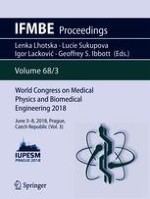2019 | OriginalPaper | Buchkapitel
Temperature-Induced Modulation of Voltage-Gated Ion Channels in Human Lung Cancer Cell Line A549 Using Automated Patch Clamp Technology
verfasst von : Sonja Langthaler, Katharina Bergmoser, Alexander Lassnig, Christian Baumgartner
Erschienen in: World Congress on Medical Physics and Biomedical Engineering 2018
Verlag: Springer Singapore
Aktivieren Sie unsere intelligente Suche, um passende Fachinhalte oder Patente zu finden.
Wählen Sie Textabschnitte aus um mit Künstlicher Intelligenz passenden Patente zu finden. powered by
Markieren Sie Textabschnitte, um KI-gestützt weitere passende Inhalte zu finden. powered by
